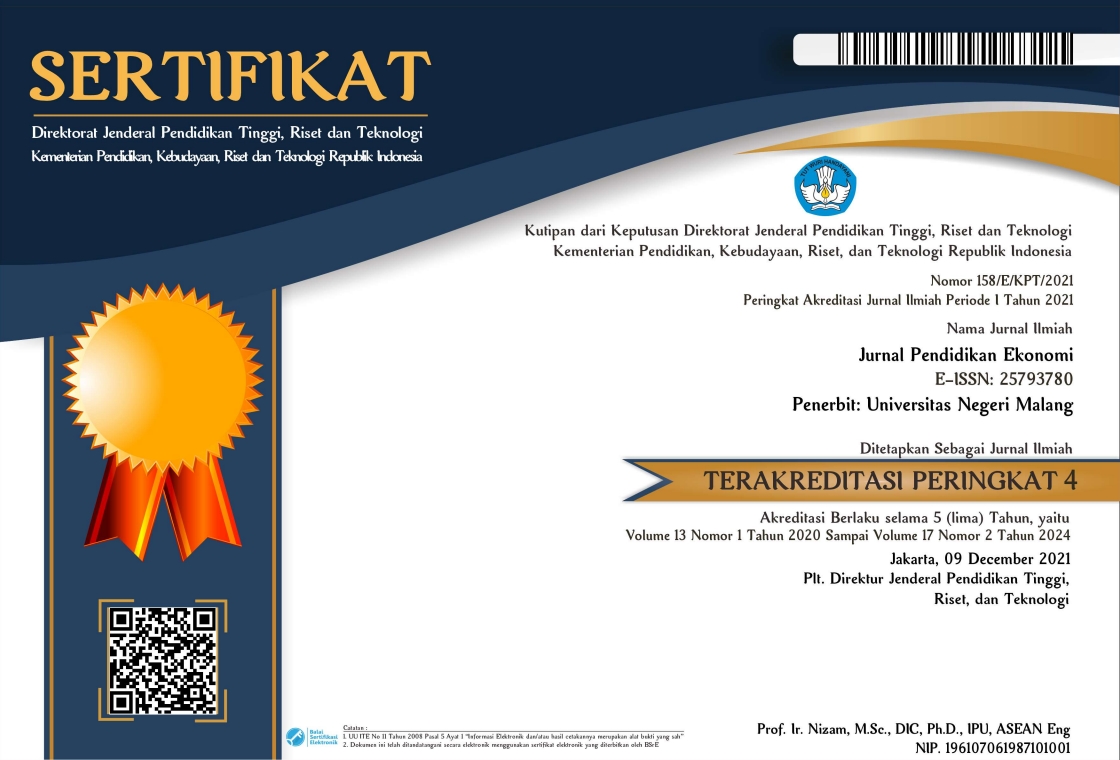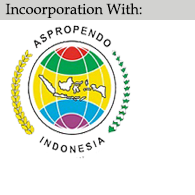Pengembangan Media Pembelajaran E-Modul Bank Dan Sistem Pembayaran Berbasis Android Untuk Peserta Didik Kelas X
Abstract
This development research carried out against the lack of understanding of the material in students in economics. The purpose of this development research is to increase students' understanding through the use of e-module learning media based on android. This research uses research and development (R&D) with ADDIE models. The research design used is the One Group Pre-test-Post-test Design with research subjects in class X IPS students for testing android based e-module learning media products. The results of limited trials as part of the development phase have received excellent results. Students' understanding was measured using gain score analysis which obtained a value of 0.57 with moderate criteria. There are significant differences in the test results between before and after using e-modules in student learning.
Keywords
Full Text:
PDFReferences
Afrina, D., Harun, S., & Efendi, N. (2018). Pengembangan E-Modul Pembelajaran Ekonomi SMA. 5.
Arsyad, A. (2014). Media Pembelajaran. Jakarta: PT Raja Grafindo Persada.
Belski, I. (2010). The Impact of Self-Assessment and Reflection on Student Learning Outcomes. AaeE 2010 Conference, 2016–2221. Sydney.
Bulman, G., & Fairlie, R. W. (2016). Technology and Education: Computers, Software, and the Internet. In Handbook of the Economics of Education (Vol. 5, pp. 239–280). https://doi.org/10.1016/B978-0-444-63459-7.00005-1
Calimag, J. N. V., Miguel, P. A. G., Conde, R. S., & Aquino, L. B. (2014). Ubiquitous Learning Environment Using Android Mobile Aplication. International Journal of Research in Engineering & Technology, Vol. 2(2), 119–128.
Christensen, R. (2002). Effects of technology integration education on the attitudes of teachers and students. Journal of Research on Technology in Education, 34(4), 411–433. https://doi.org/10.1080/15391523.2002.10782359
Chuang, Y.-T. (2014). Increasing Learning Motivation and Student Engagement through the Technology- Supported Learning Environment. Creative Education, 05(23), 1969–1978. https://doi.org/10.4236/ce.2014.523221
Ghofur, M. A., & Wahjoedi, W. (2018). Preferensi Sumber Belajar Online Mahasiswa Pendidikan Ekonomi. Jurnal Ekonomi Pendidikan Dan Kewirausahaan, 6(1), 105–114. https://doi.org/10.26740/jepk.v6n1.p105-114
Guido, R. M. D. (2014). Evaluation of a Modular Teaching Approach in Materials Science and Engineering. American Journal of Educational Research, 2(11), 1126–1130. https://doi.org/10.12691/education-2-11-20
Hamdani. (2011). Strategi Belajar Mengajar. Bandung: Pustaka Setia.
Helsper, E. J., & Eynon, R. (2010). Digital natives: Where is the evidence? British Educational Research Journal, 36(3), 503–520. https://doi.org/10.1080/01411920902989227
Jones, T,. & Brown, C. (2011). Reading Engagement : A Comparison Between E-Book And Traditional Print Books In Elementary Classroom. International Journal of Instruction, 4(2), 5–22.
Kay, D, & Kibble, J. (2016). Learning Theories 101 : application to everyday teaching and scholarship. 4, 17–25.
Nisly, S. A., Isaacs, A. N., & Merkel, K. G. (2014). Use of web-based learning modules for a general medicine advanced pharmacy practice experience. Currents in Pharmacy Teaching and Learning, 6(4), 502–506. https://doi.org/10.1016/j.cptl.2014.04.005
Pribadi, B. A. (2016). Desain dan Pengembangan Program Pelatihan Berbasis Kompetensi Implementasi Model ADDIE. Jakarta: Kencana Prenada Group.
Riduwan. (2016). Skala Pengukuran Variabel-variabel Penelitian. Bandung: Alfabeta.
Sugiyono. (2017). Metode Penelitian Kuantitatif, Kualitatif, dan R&D. Bandung: Alfabeta.
Wang, S. K., Hsu, H. Y., Campbell, T., Coster, D. C., & Longhurst, M. (2014). An investigation of middle school science teachers and students use of technology inside and outside of classrooms: considering whether digital natives are more technology savvy than their teachers. Educational Technology Research and Development, 62(6), 637–662. https://doi.org/10.1007/s11423-014-9355-4
Yogyanti, A. (2015). Pengembangan Multimedia Pembelajaran Berbasis Android untuk Meningkatkan Kemampuan Berpikir Abstrak dan Motivasi Belajar pada Materi Siklus Biogeokimia Kelas X. Universitas Negeri Yogyakarta.
Zulkarnain, A., Kadaritna, N., & Tania, L. (2015). Pengembangan E-Modul Teori Atom Mekanika Kuantumberbasis Web Dengan Pendekatan Saintifik. Jurnal Pendidikan Dan Pembelajaran Kimia, 4(1), 222–235.
Refbacks
- There are currently no refbacks.

Jurnal Penddidikan Ekonomi is licensed under a Creative Commons Attribution-NonCommercial-ShareAlike 4.0 International License





